Digital Privacy and Security: An Analytical Essay for NIT2201
VerifiedAdded on 2023/03/20
|8
|2246
|49
Essay
AI Summary
This essay delves into the multifaceted issues surrounding digital privacy and security in the contemporary digital landscape. It begins by establishing the historical significance of privacy concerns, emphasizing their heightened importance due to the ease of access and sophisticated techniques used to gather personal information. The essay explores the implications of digital documents, copyright infringement, and digital piracy. It highlights the importance of password security, private communication through encrypted messaging apps, and safe browsing practices, including URL security checks and cookie management. The essay examines the impact of social media on privacy, advising against excessive sharing and advocating for strong account security measures, including two-factor authentication. It categorizes individuals based on their digital skills and activities, highlighting the vulnerability of those with moderate to low digital skills and high activity. The essay discusses the data collection practices of IoT devices, loyalty programs, and the role of both individuals and organizations in ensuring data safety and accuracy. Finally, it examines the role of regulations such as the Australian Privacy Principles and GDPR in providing guidelines for ethical and legal data collection, emphasizing the importance of data breach notification and consumer protection.
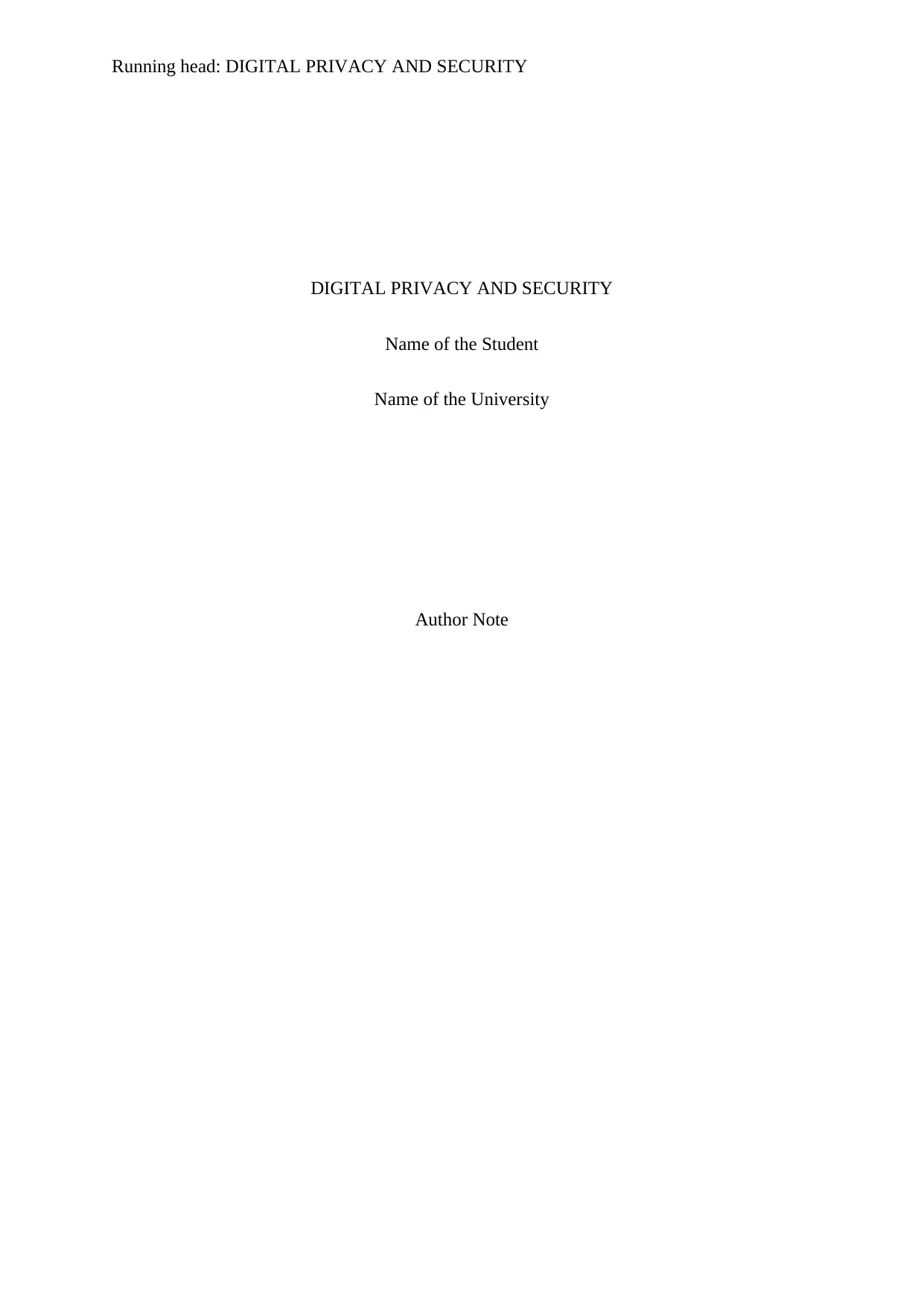
Running head: DIGITAL PRIVACY AND SECURITY
DIGITAL PRIVACY AND SECURITY
Name of the Student
Name of the University
Author Note
DIGITAL PRIVACY AND SECURITY
Name of the Student
Name of the University
Author Note
Paraphrase This Document
Need a fresh take? Get an instant paraphrase of this document with our AI Paraphraser
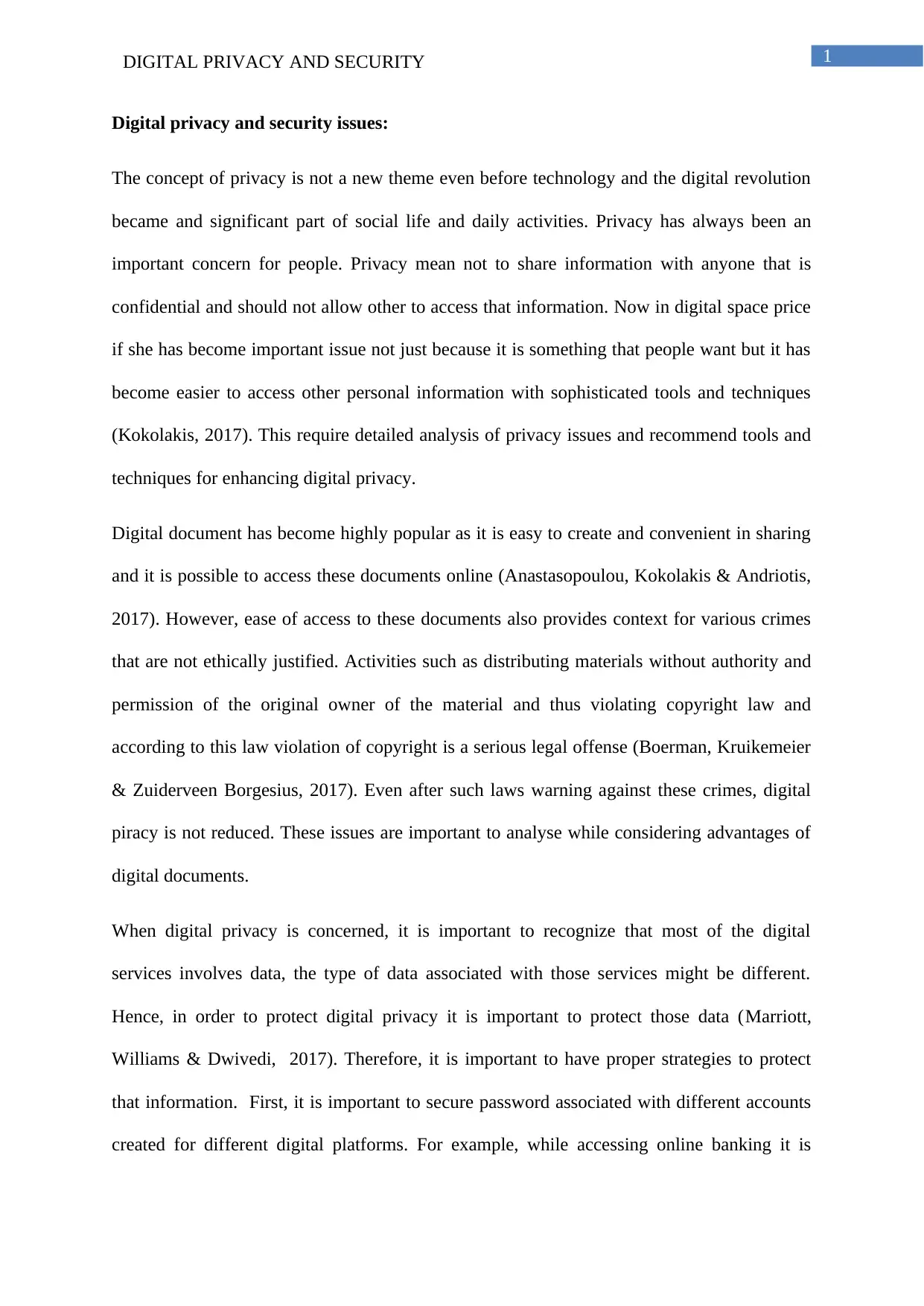
1DIGITAL PRIVACY AND SECURITY
Digital privacy and security issues:
The concept of privacy is not a new theme even before technology and the digital revolution
became and significant part of social life and daily activities. Privacy has always been an
important concern for people. Privacy mean not to share information with anyone that is
confidential and should not allow other to access that information. Now in digital space price
if she has become important issue not just because it is something that people want but it has
become easier to access other personal information with sophisticated tools and techniques
(Kokolakis, 2017). This require detailed analysis of privacy issues and recommend tools and
techniques for enhancing digital privacy.
Digital document has become highly popular as it is easy to create and convenient in sharing
and it is possible to access these documents online (Anastasopoulou, Kokolakis & Andriotis,
2017). However, ease of access to these documents also provides context for various crimes
that are not ethically justified. Activities such as distributing materials without authority and
permission of the original owner of the material and thus violating copyright law and
according to this law violation of copyright is a serious legal offense (Boerman, Kruikemeier
& Zuiderveen Borgesius, 2017). Even after such laws warning against these crimes, digital
piracy is not reduced. These issues are important to analyse while considering advantages of
digital documents.
When digital privacy is concerned, it is important to recognize that most of the digital
services involves data, the type of data associated with those services might be different.
Hence, in order to protect digital privacy it is important to protect those data (Marriott,
Williams & Dwivedi, 2017). Therefore, it is important to have proper strategies to protect
that information. First, it is important to secure password associated with different accounts
created for different digital platforms. For example, while accessing online banking it is
Digital privacy and security issues:
The concept of privacy is not a new theme even before technology and the digital revolution
became and significant part of social life and daily activities. Privacy has always been an
important concern for people. Privacy mean not to share information with anyone that is
confidential and should not allow other to access that information. Now in digital space price
if she has become important issue not just because it is something that people want but it has
become easier to access other personal information with sophisticated tools and techniques
(Kokolakis, 2017). This require detailed analysis of privacy issues and recommend tools and
techniques for enhancing digital privacy.
Digital document has become highly popular as it is easy to create and convenient in sharing
and it is possible to access these documents online (Anastasopoulou, Kokolakis & Andriotis,
2017). However, ease of access to these documents also provides context for various crimes
that are not ethically justified. Activities such as distributing materials without authority and
permission of the original owner of the material and thus violating copyright law and
according to this law violation of copyright is a serious legal offense (Boerman, Kruikemeier
& Zuiderveen Borgesius, 2017). Even after such laws warning against these crimes, digital
piracy is not reduced. These issues are important to analyse while considering advantages of
digital documents.
When digital privacy is concerned, it is important to recognize that most of the digital
services involves data, the type of data associated with those services might be different.
Hence, in order to protect digital privacy it is important to protect those data (Marriott,
Williams & Dwivedi, 2017). Therefore, it is important to have proper strategies to protect
that information. First, it is important to secure password associated with different accounts
created for different digital platforms. For example, while accessing online banking it is
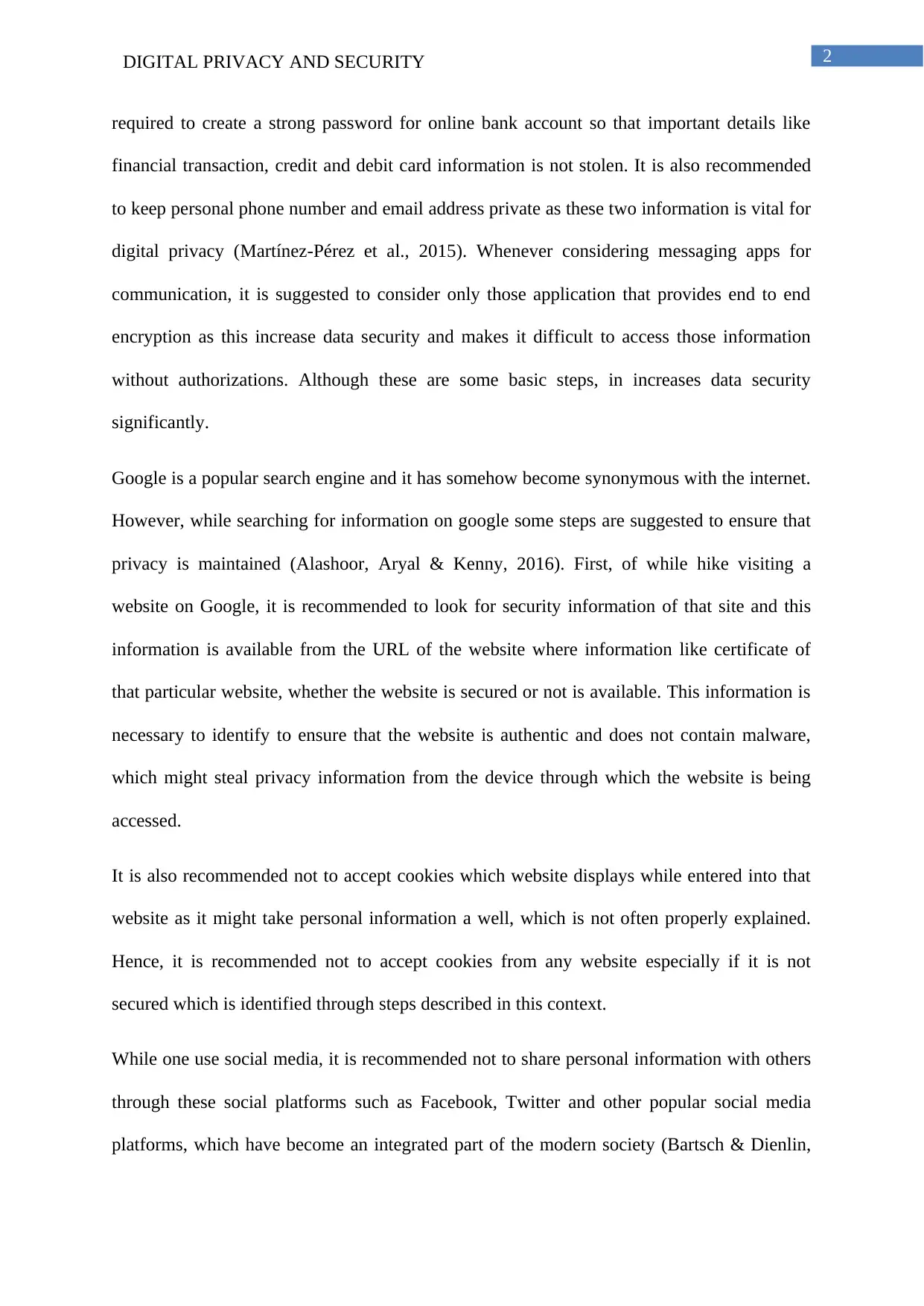
2DIGITAL PRIVACY AND SECURITY
required to create a strong password for online bank account so that important details like
financial transaction, credit and debit card information is not stolen. It is also recommended
to keep personal phone number and email address private as these two information is vital for
digital privacy (Martínez-Pérez et al., 2015). Whenever considering messaging apps for
communication, it is suggested to consider only those application that provides end to end
encryption as this increase data security and makes it difficult to access those information
without authorizations. Although these are some basic steps, in increases data security
significantly.
Google is a popular search engine and it has somehow become synonymous with the internet.
However, while searching for information on google some steps are suggested to ensure that
privacy is maintained (Alashoor, Aryal & Kenny, 2016). First, of while hike visiting a
website on Google, it is recommended to look for security information of that site and this
information is available from the URL of the website where information like certificate of
that particular website, whether the website is secured or not is available. This information is
necessary to identify to ensure that the website is authentic and does not contain malware,
which might steal privacy information from the device through which the website is being
accessed.
It is also recommended not to accept cookies which website displays while entered into that
website as it might take personal information a well, which is not often properly explained.
Hence, it is recommended not to accept cookies from any website especially if it is not
secured which is identified through steps described in this context.
While one use social media, it is recommended not to share personal information with others
through these social platforms such as Facebook, Twitter and other popular social media
platforms, which have become an integrated part of the modern society (Bartsch & Dienlin,
required to create a strong password for online bank account so that important details like
financial transaction, credit and debit card information is not stolen. It is also recommended
to keep personal phone number and email address private as these two information is vital for
digital privacy (Martínez-Pérez et al., 2015). Whenever considering messaging apps for
communication, it is suggested to consider only those application that provides end to end
encryption as this increase data security and makes it difficult to access those information
without authorizations. Although these are some basic steps, in increases data security
significantly.
Google is a popular search engine and it has somehow become synonymous with the internet.
However, while searching for information on google some steps are suggested to ensure that
privacy is maintained (Alashoor, Aryal & Kenny, 2016). First, of while hike visiting a
website on Google, it is recommended to look for security information of that site and this
information is available from the URL of the website where information like certificate of
that particular website, whether the website is secured or not is available. This information is
necessary to identify to ensure that the website is authentic and does not contain malware,
which might steal privacy information from the device through which the website is being
accessed.
It is also recommended not to accept cookies which website displays while entered into that
website as it might take personal information a well, which is not often properly explained.
Hence, it is recommended not to accept cookies from any website especially if it is not
secured which is identified through steps described in this context.
While one use social media, it is recommended not to share personal information with others
through these social platforms such as Facebook, Twitter and other popular social media
platforms, which have become an integrated part of the modern society (Bartsch & Dienlin,
⊘ This is a preview!⊘
Do you want full access?
Subscribe today to unlock all pages.

Trusted by 1+ million students worldwide
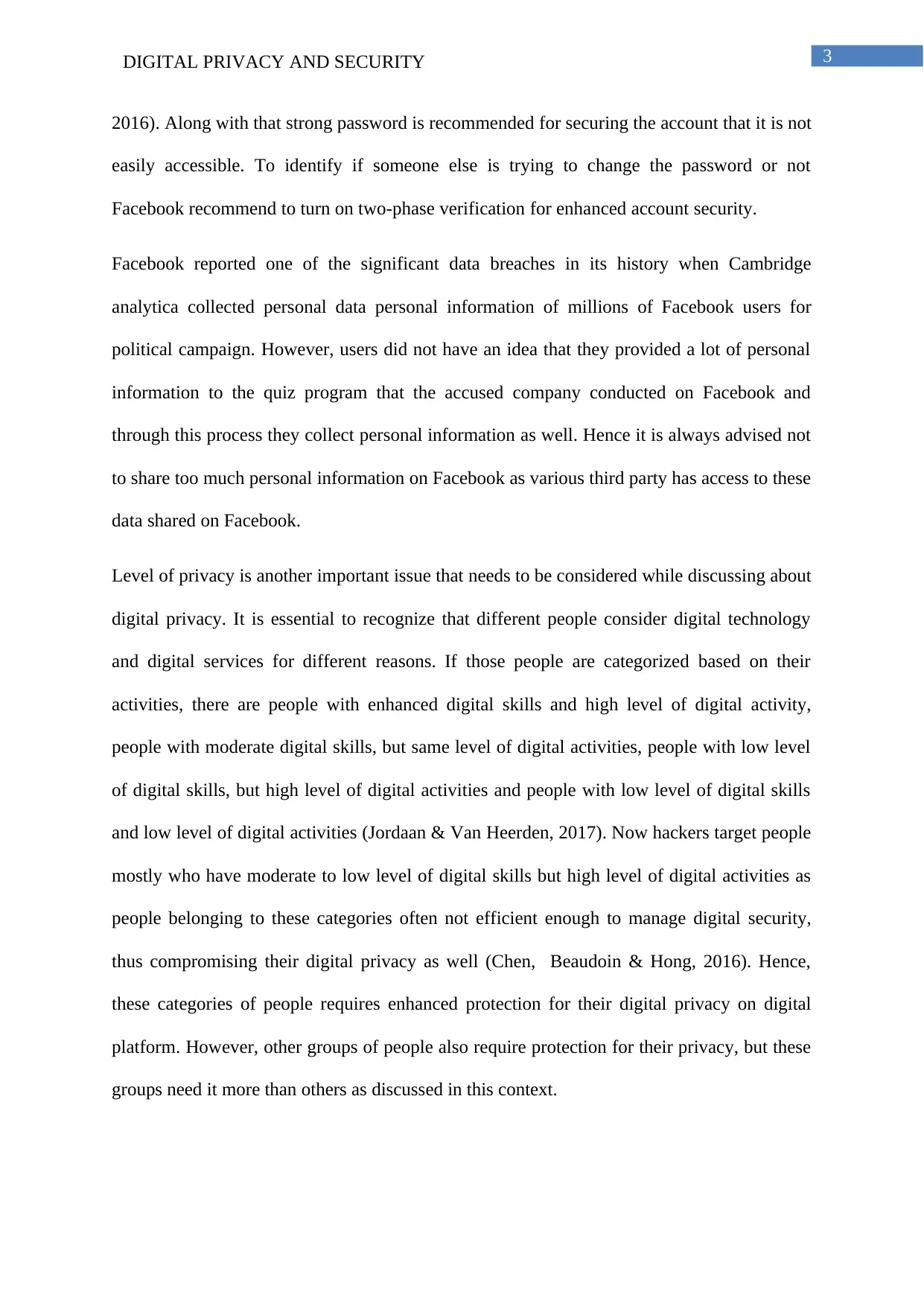
3DIGITAL PRIVACY AND SECURITY
2016). Along with that strong password is recommended for securing the account that it is not
easily accessible. To identify if someone else is trying to change the password or not
Facebook recommend to turn on two-phase verification for enhanced account security.
Facebook reported one of the significant data breaches in its history when Cambridge
analytica collected personal data personal information of millions of Facebook users for
political campaign. However, users did not have an idea that they provided a lot of personal
information to the quiz program that the accused company conducted on Facebook and
through this process they collect personal information as well. Hence it is always advised not
to share too much personal information on Facebook as various third party has access to these
data shared on Facebook.
Level of privacy is another important issue that needs to be considered while discussing about
digital privacy. It is essential to recognize that different people consider digital technology
and digital services for different reasons. If those people are categorized based on their
activities, there are people with enhanced digital skills and high level of digital activity,
people with moderate digital skills, but same level of digital activities, people with low level
of digital skills, but high level of digital activities and people with low level of digital skills
and low level of digital activities (Jordaan & Van Heerden, 2017). Now hackers target people
mostly who have moderate to low level of digital skills but high level of digital activities as
people belonging to these categories often not efficient enough to manage digital security,
thus compromising their digital privacy as well (Chen, Beaudoin & Hong, 2016). Hence,
these categories of people requires enhanced protection for their digital privacy on digital
platform. However, other groups of people also require protection for their privacy, but these
groups need it more than others as discussed in this context.
2016). Along with that strong password is recommended for securing the account that it is not
easily accessible. To identify if someone else is trying to change the password or not
Facebook recommend to turn on two-phase verification for enhanced account security.
Facebook reported one of the significant data breaches in its history when Cambridge
analytica collected personal data personal information of millions of Facebook users for
political campaign. However, users did not have an idea that they provided a lot of personal
information to the quiz program that the accused company conducted on Facebook and
through this process they collect personal information as well. Hence it is always advised not
to share too much personal information on Facebook as various third party has access to these
data shared on Facebook.
Level of privacy is another important issue that needs to be considered while discussing about
digital privacy. It is essential to recognize that different people consider digital technology
and digital services for different reasons. If those people are categorized based on their
activities, there are people with enhanced digital skills and high level of digital activity,
people with moderate digital skills, but same level of digital activities, people with low level
of digital skills, but high level of digital activities and people with low level of digital skills
and low level of digital activities (Jordaan & Van Heerden, 2017). Now hackers target people
mostly who have moderate to low level of digital skills but high level of digital activities as
people belonging to these categories often not efficient enough to manage digital security,
thus compromising their digital privacy as well (Chen, Beaudoin & Hong, 2016). Hence,
these categories of people requires enhanced protection for their digital privacy on digital
platform. However, other groups of people also require protection for their privacy, but these
groups need it more than others as discussed in this context.
Paraphrase This Document
Need a fresh take? Get an instant paraphrase of this document with our AI Paraphraser
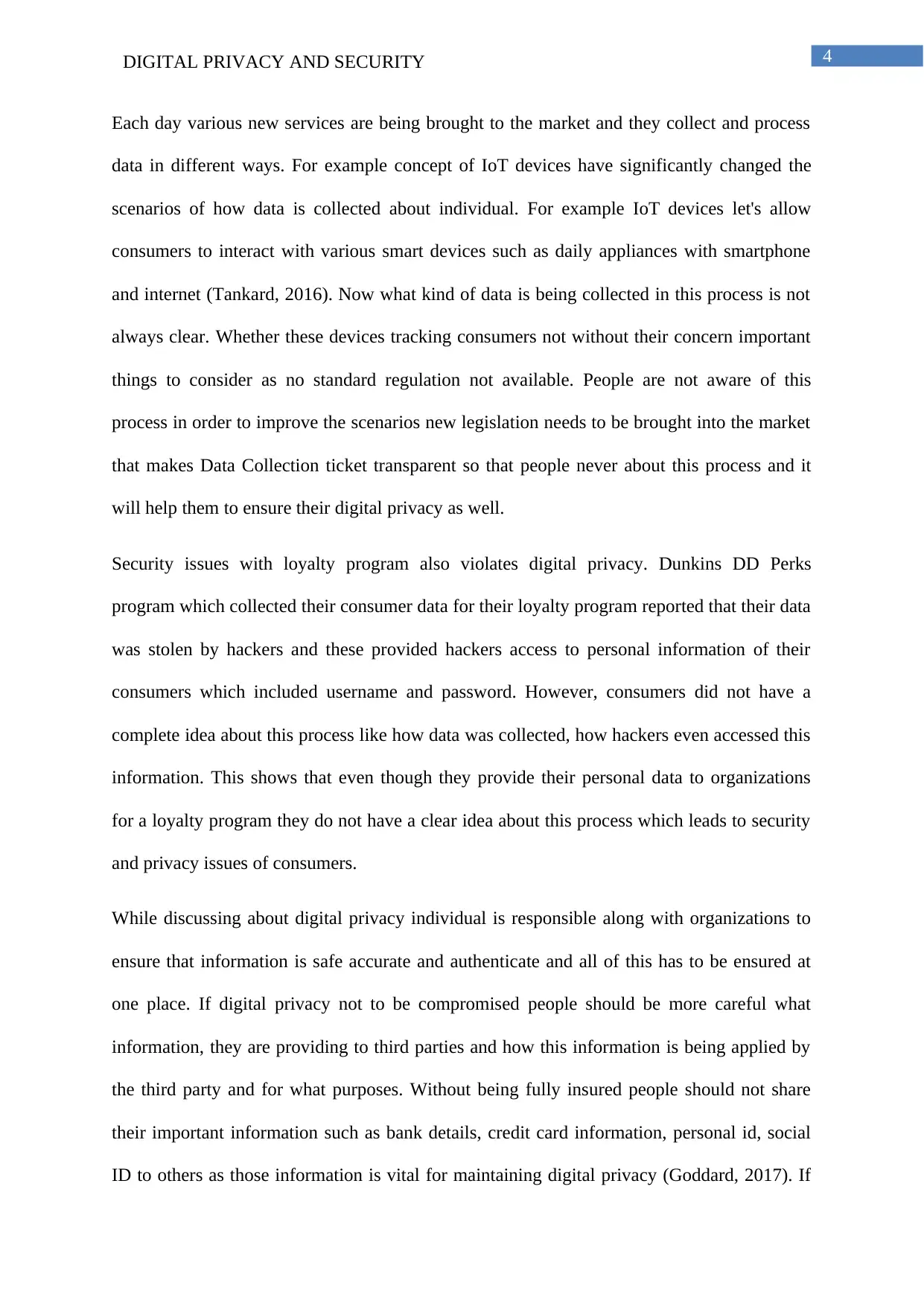
4DIGITAL PRIVACY AND SECURITY
Each day various new services are being brought to the market and they collect and process
data in different ways. For example concept of IoT devices have significantly changed the
scenarios of how data is collected about individual. For example IoT devices let's allow
consumers to interact with various smart devices such as daily appliances with smartphone
and internet (Tankard, 2016). Now what kind of data is being collected in this process is not
always clear. Whether these devices tracking consumers not without their concern important
things to consider as no standard regulation not available. People are not aware of this
process in order to improve the scenarios new legislation needs to be brought into the market
that makes Data Collection ticket transparent so that people never about this process and it
will help them to ensure their digital privacy as well.
Security issues with loyalty program also violates digital privacy. Dunkins DD Perks
program which collected their consumer data for their loyalty program reported that their data
was stolen by hackers and these provided hackers access to personal information of their
consumers which included username and password. However, consumers did not have a
complete idea about this process like how data was collected, how hackers even accessed this
information. This shows that even though they provide their personal data to organizations
for a loyalty program they do not have a clear idea about this process which leads to security
and privacy issues of consumers.
While discussing about digital privacy individual is responsible along with organizations to
ensure that information is safe accurate and authenticate and all of this has to be ensured at
one place. If digital privacy not to be compromised people should be more careful what
information, they are providing to third parties and how this information is being applied by
the third party and for what purposes. Without being fully insured people should not share
their important information such as bank details, credit card information, personal id, social
ID to others as those information is vital for maintaining digital privacy (Goddard, 2017). If
Each day various new services are being brought to the market and they collect and process
data in different ways. For example concept of IoT devices have significantly changed the
scenarios of how data is collected about individual. For example IoT devices let's allow
consumers to interact with various smart devices such as daily appliances with smartphone
and internet (Tankard, 2016). Now what kind of data is being collected in this process is not
always clear. Whether these devices tracking consumers not without their concern important
things to consider as no standard regulation not available. People are not aware of this
process in order to improve the scenarios new legislation needs to be brought into the market
that makes Data Collection ticket transparent so that people never about this process and it
will help them to ensure their digital privacy as well.
Security issues with loyalty program also violates digital privacy. Dunkins DD Perks
program which collected their consumer data for their loyalty program reported that their data
was stolen by hackers and these provided hackers access to personal information of their
consumers which included username and password. However, consumers did not have a
complete idea about this process like how data was collected, how hackers even accessed this
information. This shows that even though they provide their personal data to organizations
for a loyalty program they do not have a clear idea about this process which leads to security
and privacy issues of consumers.
While discussing about digital privacy individual is responsible along with organizations to
ensure that information is safe accurate and authenticate and all of this has to be ensured at
one place. If digital privacy not to be compromised people should be more careful what
information, they are providing to third parties and how this information is being applied by
the third party and for what purposes. Without being fully insured people should not share
their important information such as bank details, credit card information, personal id, social
ID to others as those information is vital for maintaining digital privacy (Goddard, 2017). If
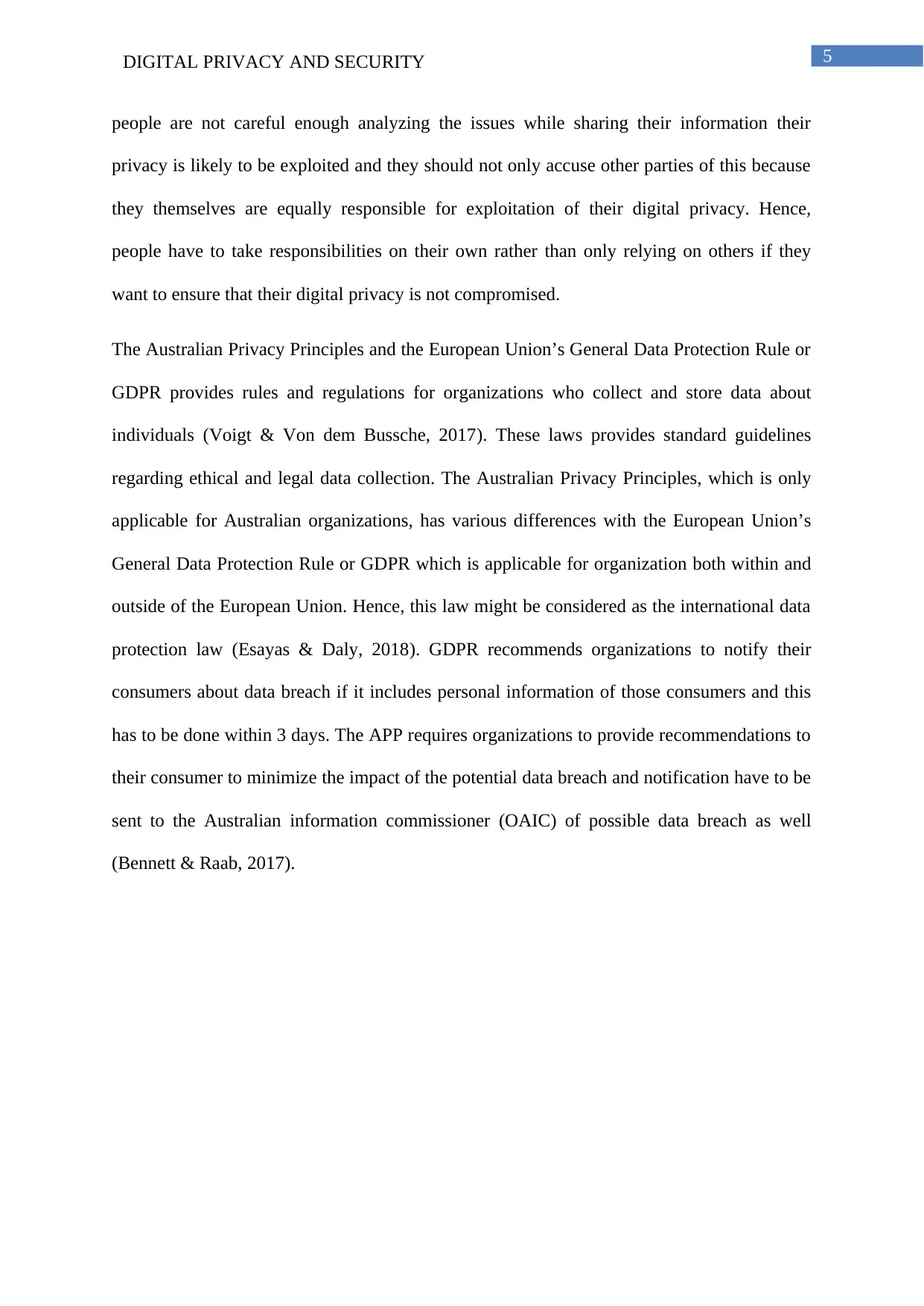
5DIGITAL PRIVACY AND SECURITY
people are not careful enough analyzing the issues while sharing their information their
privacy is likely to be exploited and they should not only accuse other parties of this because
they themselves are equally responsible for exploitation of their digital privacy. Hence,
people have to take responsibilities on their own rather than only relying on others if they
want to ensure that their digital privacy is not compromised.
The Australian Privacy Principles and the European Union’s General Data Protection Rule or
GDPR provides rules and regulations for organizations who collect and store data about
individuals (Voigt & Von dem Bussche, 2017). These laws provides standard guidelines
regarding ethical and legal data collection. The Australian Privacy Principles, which is only
applicable for Australian organizations, has various differences with the European Union’s
General Data Protection Rule or GDPR which is applicable for organization both within and
outside of the European Union. Hence, this law might be considered as the international data
protection law (Esayas & Daly, 2018). GDPR recommends organizations to notify their
consumers about data breach if it includes personal information of those consumers and this
has to be done within 3 days. The APP requires organizations to provide recommendations to
their consumer to minimize the impact of the potential data breach and notification have to be
sent to the Australian information commissioner (OAIC) of possible data breach as well
(Bennett & Raab, 2017).
people are not careful enough analyzing the issues while sharing their information their
privacy is likely to be exploited and they should not only accuse other parties of this because
they themselves are equally responsible for exploitation of their digital privacy. Hence,
people have to take responsibilities on their own rather than only relying on others if they
want to ensure that their digital privacy is not compromised.
The Australian Privacy Principles and the European Union’s General Data Protection Rule or
GDPR provides rules and regulations for organizations who collect and store data about
individuals (Voigt & Von dem Bussche, 2017). These laws provides standard guidelines
regarding ethical and legal data collection. The Australian Privacy Principles, which is only
applicable for Australian organizations, has various differences with the European Union’s
General Data Protection Rule or GDPR which is applicable for organization both within and
outside of the European Union. Hence, this law might be considered as the international data
protection law (Esayas & Daly, 2018). GDPR recommends organizations to notify their
consumers about data breach if it includes personal information of those consumers and this
has to be done within 3 days. The APP requires organizations to provide recommendations to
their consumer to minimize the impact of the potential data breach and notification have to be
sent to the Australian information commissioner (OAIC) of possible data breach as well
(Bennett & Raab, 2017).
⊘ This is a preview!⊘
Do you want full access?
Subscribe today to unlock all pages.

Trusted by 1+ million students worldwide
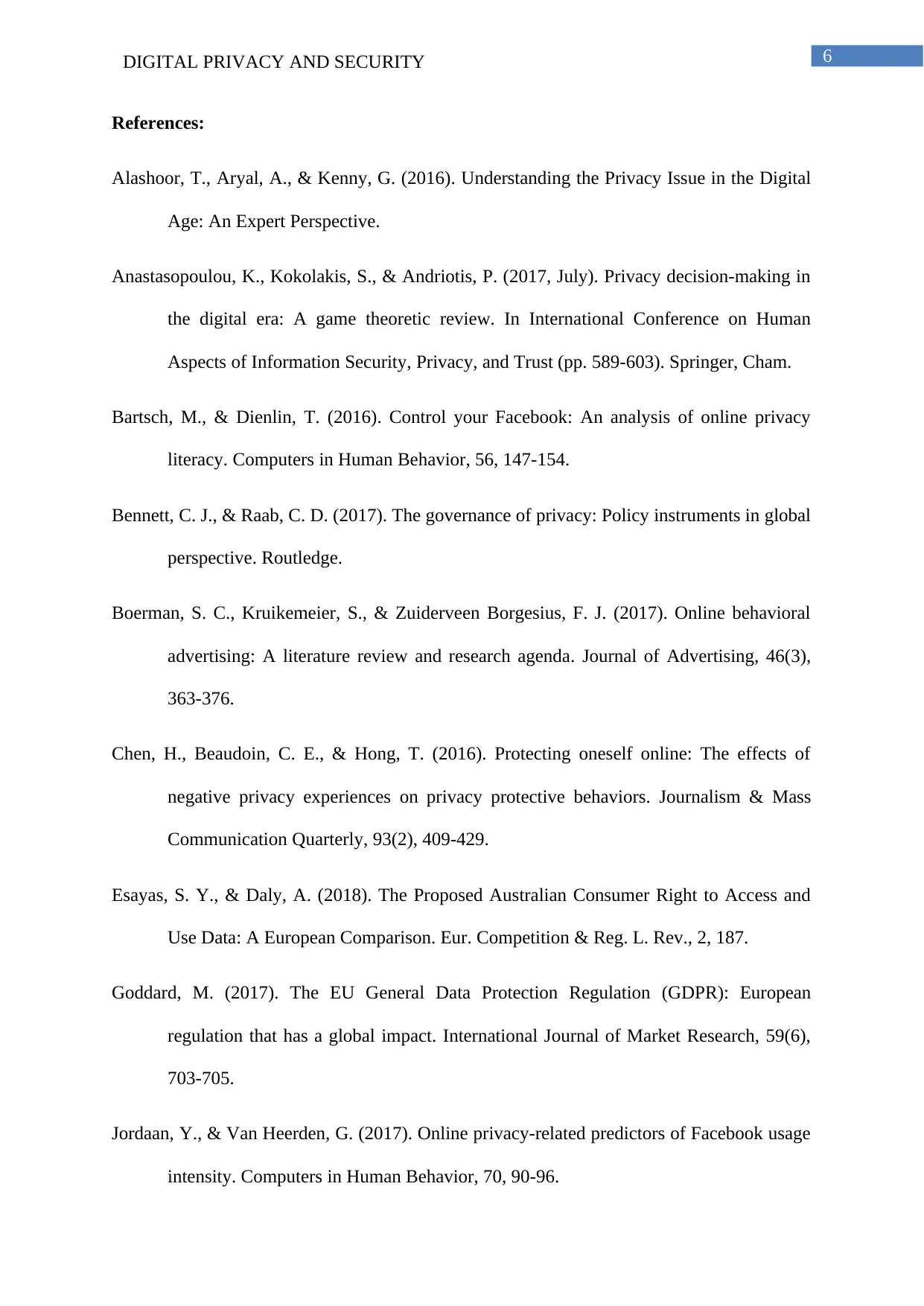
6DIGITAL PRIVACY AND SECURITY
References:
Alashoor, T., Aryal, A., & Kenny, G. (2016). Understanding the Privacy Issue in the Digital
Age: An Expert Perspective.
Anastasopoulou, K., Kokolakis, S., & Andriotis, P. (2017, July). Privacy decision-making in
the digital era: A game theoretic review. In International Conference on Human
Aspects of Information Security, Privacy, and Trust (pp. 589-603). Springer, Cham.
Bartsch, M., & Dienlin, T. (2016). Control your Facebook: An analysis of online privacy
literacy. Computers in Human Behavior, 56, 147-154.
Bennett, C. J., & Raab, C. D. (2017). The governance of privacy: Policy instruments in global
perspective. Routledge.
Boerman, S. C., Kruikemeier, S., & Zuiderveen Borgesius, F. J. (2017). Online behavioral
advertising: A literature review and research agenda. Journal of Advertising, 46(3),
363-376.
Chen, H., Beaudoin, C. E., & Hong, T. (2016). Protecting oneself online: The effects of
negative privacy experiences on privacy protective behaviors. Journalism & Mass
Communication Quarterly, 93(2), 409-429.
Esayas, S. Y., & Daly, A. (2018). The Proposed Australian Consumer Right to Access and
Use Data: A European Comparison. Eur. Competition & Reg. L. Rev., 2, 187.
Goddard, M. (2017). The EU General Data Protection Regulation (GDPR): European
regulation that has a global impact. International Journal of Market Research, 59(6),
703-705.
Jordaan, Y., & Van Heerden, G. (2017). Online privacy-related predictors of Facebook usage
intensity. Computers in Human Behavior, 70, 90-96.
References:
Alashoor, T., Aryal, A., & Kenny, G. (2016). Understanding the Privacy Issue in the Digital
Age: An Expert Perspective.
Anastasopoulou, K., Kokolakis, S., & Andriotis, P. (2017, July). Privacy decision-making in
the digital era: A game theoretic review. In International Conference on Human
Aspects of Information Security, Privacy, and Trust (pp. 589-603). Springer, Cham.
Bartsch, M., & Dienlin, T. (2016). Control your Facebook: An analysis of online privacy
literacy. Computers in Human Behavior, 56, 147-154.
Bennett, C. J., & Raab, C. D. (2017). The governance of privacy: Policy instruments in global
perspective. Routledge.
Boerman, S. C., Kruikemeier, S., & Zuiderveen Borgesius, F. J. (2017). Online behavioral
advertising: A literature review and research agenda. Journal of Advertising, 46(3),
363-376.
Chen, H., Beaudoin, C. E., & Hong, T. (2016). Protecting oneself online: The effects of
negative privacy experiences on privacy protective behaviors. Journalism & Mass
Communication Quarterly, 93(2), 409-429.
Esayas, S. Y., & Daly, A. (2018). The Proposed Australian Consumer Right to Access and
Use Data: A European Comparison. Eur. Competition & Reg. L. Rev., 2, 187.
Goddard, M. (2017). The EU General Data Protection Regulation (GDPR): European
regulation that has a global impact. International Journal of Market Research, 59(6),
703-705.
Jordaan, Y., & Van Heerden, G. (2017). Online privacy-related predictors of Facebook usage
intensity. Computers in Human Behavior, 70, 90-96.
Paraphrase This Document
Need a fresh take? Get an instant paraphrase of this document with our AI Paraphraser
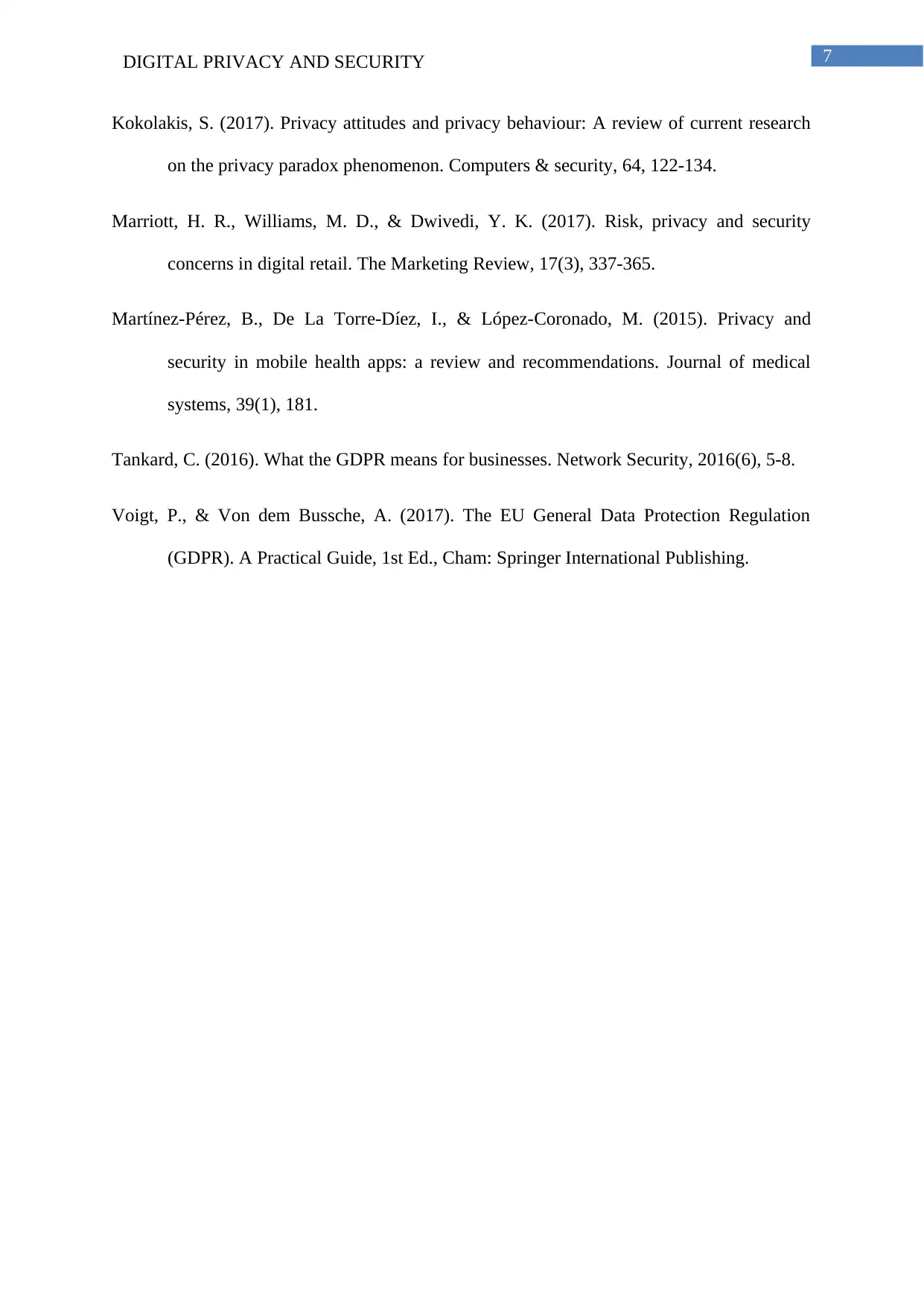
7DIGITAL PRIVACY AND SECURITY
Kokolakis, S. (2017). Privacy attitudes and privacy behaviour: A review of current research
on the privacy paradox phenomenon. Computers & security, 64, 122-134.
Marriott, H. R., Williams, M. D., & Dwivedi, Y. K. (2017). Risk, privacy and security
concerns in digital retail. The Marketing Review, 17(3), 337-365.
Martínez-Pérez, B., De La Torre-Díez, I., & López-Coronado, M. (2015). Privacy and
security in mobile health apps: a review and recommendations. Journal of medical
systems, 39(1), 181.
Tankard, C. (2016). What the GDPR means for businesses. Network Security, 2016(6), 5-8.
Voigt, P., & Von dem Bussche, A. (2017). The EU General Data Protection Regulation
(GDPR). A Practical Guide, 1st Ed., Cham: Springer International Publishing.
Kokolakis, S. (2017). Privacy attitudes and privacy behaviour: A review of current research
on the privacy paradox phenomenon. Computers & security, 64, 122-134.
Marriott, H. R., Williams, M. D., & Dwivedi, Y. K. (2017). Risk, privacy and security
concerns in digital retail. The Marketing Review, 17(3), 337-365.
Martínez-Pérez, B., De La Torre-Díez, I., & López-Coronado, M. (2015). Privacy and
security in mobile health apps: a review and recommendations. Journal of medical
systems, 39(1), 181.
Tankard, C. (2016). What the GDPR means for businesses. Network Security, 2016(6), 5-8.
Voigt, P., & Von dem Bussche, A. (2017). The EU General Data Protection Regulation
(GDPR). A Practical Guide, 1st Ed., Cham: Springer International Publishing.
1 out of 8
Related Documents
Your All-in-One AI-Powered Toolkit for Academic Success.
+13062052269
info@desklib.com
Available 24*7 on WhatsApp / Email
![[object Object]](/_next/static/media/star-bottom.7253800d.svg)
Unlock your academic potential
Copyright © 2020–2026 A2Z Services. All Rights Reserved. Developed and managed by ZUCOL.





